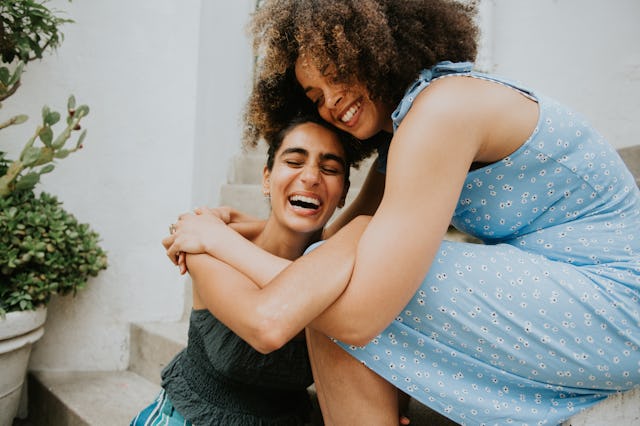My Village Is Full Of Young, Childless Women & I Wouldn’t Have It Any Other Way
There’s no internal comparison, no anxiety about whether I’m doing this right.

It’s 9pm, my kids are asleep, and I’m on the phone with Keira, a friend and former coworker in her mid-20s. Smart and funny with an old soul, Keira could technically be my daughter, a la Gilmore Girls. But when we found ourselves bonding over a love of comedian Ali Wong, or giggling over the hotness of actor Dev Patel, the years collapsed. I never expected us to stay in touch to the extent that we have, but here she is, humoring my ancient ways with an actual phone call instead of a meandering exchange of text messages and emojis.
As I sip Pinot Noir from a chipped mug, our conversation moves from drama at my old workplace, which now feels like a soap opera I can enjoy from a safe distance, to my week juggling meetings and my kids’ back-to-back colds. Her reaction is warm and sympathetic, punctuated by musical laughter. I ask about her boyfriend and her brother, who has special needs. She’s driving, and I picture her on the highway, the lights of the city blurring by. By the end of our hour-long conversation, I feel relaxed, lighter.
Lately, I’ve realized that the friends I find easiest to talk to are like Keira — significantly younger than me and are not mothers. At first I assumed I was more of a mentor. But as these relationships developed over time, I realized our age difference didn’t matter. Just because we weren’t sharing the same phase of life didn’t mean we couldn’t connect in real ways. And in fact, the distinction often allowed me to be more open about my experiences.
When I became a mother eight years ago, I assumed a support system of local moms would emerge naturally. But as I shuttled between work and home, perpetually late and emotionally drained, I realized how hard it was to cultivate the relationships I craved. I wanted a village, but I lived in a major metropolitan city where no one made eye contact, let alone exchanged phone numbers.
After my second child, I experimented with Peanut, an app for moms, to try and find local friends. I had never dated online, and it felt strange and exciting to analyze strangers’ faces, swiping right and left in a quest for connection. But shortly after my second meet-up with a new mom who lived a few subway stops away, the pandemic hit. I remember discussing the mysterious disease as we bounced our babies on our laps in Central Park in March of 2020. When lockdown hit, she and her family left the city. We spoke on the phone a few times, but soon fell out of touch, our friendship too new to survive disaster.
When I did manage to connect with old friends after months, sometimes years, of phone tag, I felt guarded, sensitive to judgment, and a desire to seem like I had everything under control. It’s not that my friends were critical or unkind; my discomfort derived largely from my own insecurities. If a friend mentioned how many sports her kids were in, I felt a pang of guilt. Were my kids in enough activities? If a parent spoke of her screen time rules, I worried I wasn’t strict enough. I cringed when my stay-at-home mom friends said things like, “I don’t know how you do it!” Sometimes talking to a fellow parent was like holding a mirror up to myself, the unflattering kind that enlarges one’s pores and reveals every blemish.
But with friends like Keira, the pressure was lifted. Because we weren’t subconsciously competing to be the better parent, I could speak freely about my highs and lows. Their empathetic reaction was often the one I needed most. It was a relief to have someone say, with genuine awe, “Wow, that really sucks that your kid puked in your bed.” Or, “Your day sounds really overwhelming.” I didn’t need a list of solutions or an even grosser anecdote to one-up mine; I needed someone to acknowledge me.
In exchange, I listened to their stories of new relationships and first apartments, bearing witness to their milestones and crossroads. Now that I was a parent, I found myself looking at the familiar experiences through new eyes. I used this modicum of enlightenment to give advice when I could, relieved to have made it through the gauntlet of young adulthood. Our age gap seemed to provide the distance needed to see each other more clearly.
For a long time, I was so fixated on the idea of finding mom friends that I didn’t fully appreciate the people who were showing up for me. The people who texted me back and returned my calls. Who met up for tacos and happy hour. Who let me cry and told me I was doing a good job. If they ever become parents, I’ll be here for them, the wizened aunty ready with tissues and wine.
Sumitra Mattai is a New York City-based writer, textile designer and mother of two. She holds a BFA in Textile Design from the Rhode Island School of Design and an MFA in Creative Writing from The New School.